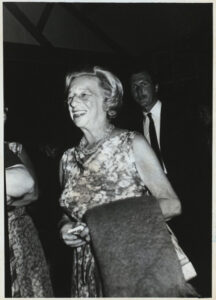Lillian Hellman
New Orleans native Lillian Hellman was the author of several successful plays, as well as her popular memoirs.

Courtesy of New York Public Library
Lillian Hellman. Unidentified
New Orleans native Lillian Hellman wrote a series of successful plays in the mid-twentieth century, followed by the publication her best-selling memoirs in the 1960s and 1970s. Though perhaps best known for her 1939 play, The Little Foxes—a critique of greedy, social-climbing southerners—Hellman’s plays Watch on the Rhine and Toys in the Attic won New York Drama Critics’ Circle Awards as well. Hellman’s leftist politics informed much of her writing and public persona. Indeed, her communist sympathies led to her being blacklisted in Hollywood in the late 1940s and summoned before the House Un-American Activities Committee in 1952. In 1970, Hellman received the National Book Award for one of her memoirs, An Unfinished Woman. Her life remained controversial to the end, her final years being marked by an infamous literary feud with writer/activist Mary McCarthy.
Early Life
Lillian Florence Hellman was born June 20, 1905, in New Orleans, the only child of Max Bernard Hellman and Julia Newhouse. Both sides of Hellman’s family were of German Jewish ancestry but had lived in the South for several generations. When Hellman was five, her father, a shoe salesman, moved the family to New York City. Subsequently, Hellman spent half the year in New Orleans, staying with paternal aunts at their Prytania Street boardinghouse. The rest of the year she spent with her parents in New York City, where she moved when sixteen. After attending New York University, she took a position as a manuscript reader for publisher Horace Liveright, where she recommended, among other things, the New Orleans-set novel Mosquitoes, by the young William Faulkner, for publication.
Hellman married theatrical press agent Arthur Kober on December 31, 1925, and spent the remainder of the decade writing book reviews, reading scripts, and traveling in Europe. In 1930, the couple relocated to Hollywood, California, where Hellman worked as a manuscript reader for Metro-Goldwyn-Mayer. That same year she met popular crime writer Dashiell Hammett, with whom she had a tempestuous thirty-year companionship after her divorce from Kober in 1932. It was Hammett, many feel, who guided Hellman in both her early literary endeavors and her commitment to leftist politics.
Hellman’s Plays
Returning to New York after her divorce, Hellman collaborated with critic Louis Kronenberger to write the play Dear Queen. Though completed in 1932, it was never produced. Her first solo attempt at playwriting was The Children’s Hour, which opened on Broadway November 20, 1934. It ran for 691 performances, thanks partly to the play’s controversial focus on accusations of lesbianism in a girls’ school. Subsequent plays included Days to Come, The Little Foxes, Watch on the Rhine, The Searching Wind, and Another Part of the Forest, a prequel to The Little Foxes, all written in the 1930s and 1940s. In the 1950s and early 1960s she wrote The Autumn Garden, Toys in the Attic, and the unsuccessful absurdist farce My Mother, My Father and Me.
Contemporary critics usually consider The Little Foxes Hellman’s best play. A savage indictment of nouveau riche southerners at the turn of the twentieth century, The Little Foxes draws extensively upon Hellman’s family heritage—though divorced of its Jewish identity. Tallulah Bankhead starred in its initial run on Broadway, while Bette Davis assumed the role of the protagonist in the Oscar-nominated film.
During her key decades as a dramatist, Hellman also continued to work as a screenwriter in Hollywood. In the 1930s and 1940s, she adapted for film Guy Bolton’s Dark Angel and Sidney’s Kingsley’s Dead End, as well as her own plays The Children’s Hour (sanitized to feature a heterosexual love triangle and retitled These Three), The Little Foxes, and The Searching Wind. She also wrote the original screenplay for North Star, a propagandistic World War II film depicting Soviet resistance to the German invasion of a Ukrainian village.
In the late 1940s, however, Hellman’s career slowed when she, along with many others, was blacklisted in Hollywood for her alleged sympathies with the Communist Party. Called before the House Un-American Activities Committee in 1952, Hellman famously refused to testify. In a letter written in response to her subpoena, she asserted, “I cannot and will not cut my conscience to fit this year’s fashions.” Though Hellman was ultimately excused from appearing before the committee, she was blacklisted until the 1960s.
Hellman’s Memoirs and Final Years
In the 1960s and 1970s, after Hammett’s death, Hellman turned increasingly to writing autobiographical memoirs. These best-sellers included An Unfinished Woman; Pentimento, subtitled “A Book of Portraits”; and Scoundrel Time. Critics, including some fellow liberals like Diana Trilling, suggested that Hellman often resorted to evasions, omissions, and falsehoods in these works. Others accused Hellman of outright plagiarism in the “Julia” section of Pentimento, arguing that Hellman appropriated the story of Muriel Gardiner—who smuggled money to antifascist efforts in Nazi Germany—as her own.
Perhaps the most directly outspoken of Hellman’s critics was writer/political activist Mary McCarthy. On a 1980 episode of the Dick Cavett Show, McCarthy made the hyperbolic assessment that all Hellman wrote was false, “including ‘and’ and ‘the.’” Though Hellman sued for libel, the ongoing feud revealed even more untruthful elements to the memoirs. (Hellman’s estate dropped the case after her death.) Nora Ephron provided her own perspective on the feud in her 2002 play Imaginary Friends.
Having suffered a range of illnesses, strokes, and near-blindness in her last years, as well as the attacks on her veracity, Hellman retreated to her summer home on Martha’s Vineyard, Massachusetts. She died June 30, 1984, in Tisbury, Massachusetts. She continues to be regarded as one of the most talented and controversial American playwrights of the twentieth century.
